法律英语参考答案
法律英语练习题答案
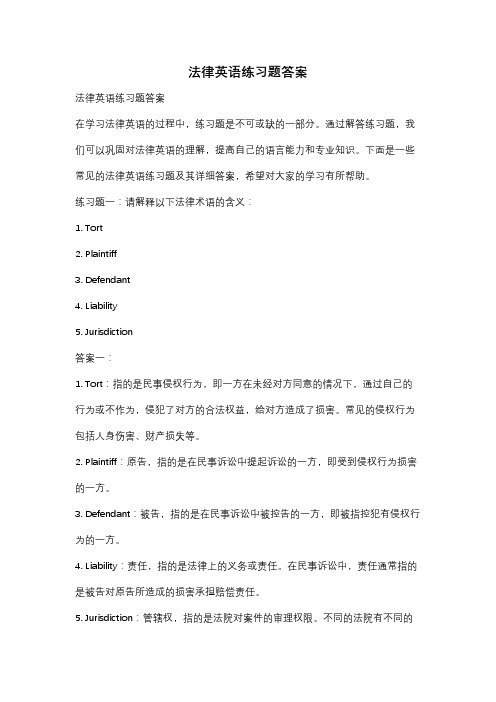
法律英语练习题答案法律英语练习题答案在学习法律英语的过程中,练习题是不可或缺的一部分。
通过解答练习题,我们可以巩固对法律英语的理解,提高自己的语言能力和专业知识。
下面是一些常见的法律英语练习题及其详细答案,希望对大家的学习有所帮助。
练习题一:请解释以下法律术语的含义:1. Tort2. Plaintiff3. Defendant4. Liability5. Jurisdiction答案一:1. Tort:指的是民事侵权行为,即一方在未经对方同意的情况下,通过自己的行为或不作为,侵犯了对方的合法权益,给对方造成了损害。
常见的侵权行为包括人身伤害、财产损失等。
2. Plaintiff:原告,指的是在民事诉讼中提起诉讼的一方,即受到侵权行为损害的一方。
3. Defendant:被告,指的是在民事诉讼中被控告的一方,即被指控犯有侵权行为的一方。
4. Liability:责任,指的是法律上的义务或责任。
在民事诉讼中,责任通常指的是被告对原告所造成的损害承担赔偿责任。
5. Jurisdiction:管辖权,指的是法院对案件的审理权限。
不同的法院有不同的管辖权,根据案件的性质、金额等因素来决定哪个法院有权审理该案件。
练习题二:请将以下英文法律名词翻译成中文:1. Contract2. Arbitration3. Injunction4. Intellectual property5. Negligence答案二:1. 合同2. 仲裁3. 禁令4. 知识产权5. 过失练习题三:请解释以下法律原则的含义:1. Presumption of innocence2. Due process3. Burden of proof4. Reasonable doubt5. Double jeopardy答案三:1. Presumption of innocence:无罪推定,指的是在刑事诉讼中,被告在未被证明有罪之前,应被认定为无罪。
法律英语教程答案

法律英语教程答案【篇一:法律英语课后习题大全】how was common law established?answer: the common law tradition originated in england. a new legal order was established as early as 1066 by the norman conquest, but the common law did not exist in1066.william the conqueror did not abolish the local customs and the local courts. local courts continued to apply local customs. there was no law common to the whole kingdom. the king did however establish some royal courts at westminster. their jurisdiction was at first very limited but eventually expanded to the point where the local courts fell into disuse. the decisions of the royal courts became the law common to the whole kingdom, the common law.1.what does the common law tradition include according to the text? answer: according to the text, the common law tradition includes law and equity.2.how different is the legal system of louisiana from the rest of the united states?answer: the common law was received in many countries such as united states, but the louisiana excepted, because where the civil law was in place before the united states gained jurisdiction.4.what does “civil law ”mean?answer: the expression “civil law ”,in latin jus civilis, literally meansthe law of the citizens of rome. it is the law of the city of rome, the law applied to a citizen (in latin, civis) of rome as opposed to the law applied to a non-citizen.5.what is the main difference between the civil law system and common law system?answer: first and foremost, cases are usually considered to be the primary source of law in common law countries, but in civil law countries, cases are simply not a source of law---at least in theory. civil law jurist will consider the civil code as an all encompassing document, but in common law jurisdictionslegislation tends to be considered as an exception to the case law.6.what different attitudes do the civil law system and the common law system hold towards case law?answer: cases are usually considered to be the primary source of law in common law countries, but in civil law countries, cases are simply not a source of law---at least in theory, but cases are becoming more and more relevant in civil law countries, but the attitudes of civilians and common lawyers toward legislation and cases differ greatly.7.what is significant about the american legal education? how is law school teaching different from ours?answer: american legal education is very original and in many respects unique. legal education tends to be longer than other common lawcountries; law is a postgraduate degree in the u.s.the teaching style is magisterial----the professor exposes the law to his or her students, who take notes and do not intervene in class.8. is law degree an undergraduate degree in the u.s.? how do people get a law degree in the u.s.?answer: no, the law degree is a master degree in the u.s., the students must have at least a bachelors degree in some areaof study, and then to study the law and get the law degree.9. can you compare the legal method employed in the american legal education and the legal method used in other countries?answer: american legal education is a very original and in many respects unique. the case method or socratic method is peculiar to this country .it must be clear to you by now that the case method could not have been thought of in a civil law country. in those countries (as in the case in england) law is an undergraduate degree. legal education tends to be longer than in the united states. the teaching style is magisterial-the professor exposes the law to his or her students, who take notes and do not intervene in class.10. who play an important role in defining the law in civil law system, law professors or judges? what about the common law system?answer: law professors, because civil law students will read law doctrine more than cases. the doctrine is the cumulated writings oflaw professors on what the law is or should be. in civil law the doctrine is considered to be a source of law and a highly respected one. you have to remember that the university, not the courts, reintroduced the civil law in continental europe. it is therefore not surprising that law professors still have an import role in defining the law. common law professors generally do not enjoy a similar prestige within their own jurisdiction. here the judges get most of the prestige. 1. how is case law created?the decisions of judges, or of other officials empowered by the constitution or laws of a political entity to hear and decide controversies, create case law.2. what dose a particular decision mean to the parties to a lawsuit?to the lawyers, judges, and law students?1) from the point of view of parties to a lawsuit or other contestedcontroversy, what matters is the immediate outcome, the result the tribunal reaches in their case. it means wether the aggrieved party or damaged party will obtain a remedy.2) in the view of judges, lawyers and law students, however, the decisiontakes on broader perspective. the decision becomes a possible source of general applicable case law.3. according to professor llwellyn, what creates a legal system ofprecedent? why and when?1) those generalizations contained in, or built upon, past decisionscreate a legal system of precedent.2) because as rules of action arise out of the solution of particularproblems, in any judicial system rules of law arise sooner or later out of such decisions of cases, weather or not such formulations are desired, intended or consciously recognized.3) when those generalizations are taken as normative for future dispute,a legal system of precedent created.4. what might happen if a court follows the precedentsmechanically?a court that follows precedent mechanically or too strictly will at times perpetuate legal rules and concepts5. what is the problem remaining in the legal system recognizing past decisions as authoritative sources of law for future cases?the continuing problem in a legal system that recognizes past decisions as authoritative sources of law for future cases is how to maintain an acceptable accommodation of the competing values of stability in a law, served by adherence to precedent, and responsiveness to social change, which may call for the abandonment of an outworn legal doctrine.6. explain these two latin terms: “stare decisis” and “res judicata”?【篇二:法律英语教程第2单元text a翻译】高法院以“一种强烈地分裂的争议”的方式谈及了堕胎案,这种争议“有寻常案件的判决所不具有的维度”。
法律英语教程答案

法律英语教程答案法律英语教程答案【篇一:法律英语课后习题大全】how was common law established?answer: the common law tradition originated in england. a new legal order was established as early as 1066 by the norman conquest, but the common law did not exist in1066.william the conqueror did not abolish the local customs and the local courts. local courts continued to apply local customs. there was no law common to the whole kingdom. the king did however establish some royal courts at westminster. their jurisdiction was at first very limited but eventually expanded to the point where the local courts fell into disuse. the decisions of the royal courts became the law common to the whole kingdom, the common law.1.what does the common law tradition include according to the text? answer: according to the text, the common law tradition includes law and equity.2.how different is the legal system of louisiana from the rest of the united states?answer: the common law was received in many countries such as united states, but the louisiana excepted, because where the civil law was in place before the united states gained jurisdiction.4.what does “civil law ”mean?answer: the expression “civil law ”,in latin jus civilis, literally meansthe law of the citizens of rome. it is the law of the city of rome, the law applied to a citizen (in latin, civis) of rome as opposed tothe law applied to a non-citizen.5.what is the main difference between the civil law system and common law system?answer: first and foremost, cases are usually considered to be the primary source of law in common law countries, but in civil law countries, cases are simply not a source of law---at least in theory. civil law jurist will consider the civil code as an all encompassing document, but in common law jurisdictions legislation tends to be considered as an exception to the case law.6.what different attitudes do the civil law system and the common law system hold towards case law?answer: cases are usually considered to be the primary source of law in common law countries, but in civil law countries, cases are simply not a source of law---at least in theory, but cases are becoming more and more relevant in civil law countries, but the attitudes of civilians and common lawyers toward legislation and cases differ greatly.7.what is significant about the american legal education? how is law school teaching different from ours?answer: american legal education is very original and in many respects unique. legal education tends to be longer than other common lawcountries; law is a postgraduate degree in the u.s.the teaching style is magisterial----the professor exposes the law to his or her students, who take notes and do not intervene in class.8. is law degree an undergraduate degree in the u.s.? how do people get a law degree in the u.s.?answer: no, the law degree is a master degree in the u.s., thestudents must have at least a bachelors degree in some area of study, and then to study the law and get the law degree.9. can you compare the legal method employed in the american legal education and the legal method used in other countries?answer: american legal education is a very original and in many respects unique. the case method or socratic method is peculiar to this country .it must be clear to you by now that the case method could not have been thought of in a civil law country. in those countries (as in the case in england) law is an undergraduate degree. legal education tends to be longer than in the united states. the teaching style is magisterial-the professor exposes the law to his or her students, who take notes and do not intervene in class.10. who play an important role in defining the law in civil law system, law professors or judges? what about the common law system?answer: law professors, because civil law students will read law doctrine more than cases. the doctrine is the cumulated writings oflaw professors on what the law is or should be. in civil law the doctrine is considered to be a source of law and a highly respected one. you have to remember that the university, not the courts, reintroduced the civil law in continental europe. it is therefore not surprising that law professors still have an import role in defining the law. common law professors generally do not enjoy a similar prestige within their own jurisdiction. here the judges get most of the prestige. 1. how is case law created?the decisions of judges, or of other officials empowered by the constitution or laws of a political entity to hear and decidecontroversies, create case law.2. what dose a particular decision mean to the parties to a lawsuit?to the lawyers, judges, and law students?1) from the point of view of parties to a lawsuit or other contestedcontroversy, what matters is the immediate outcome, the result the tribunal reaches in their case. it means wether the aggrieved party or damaged party will obtain a remedy.2) in the view of judges, lawyers and law students, however, the decisiontakes on broader perspective. the decision becomes a possible source of general applicable case law.3. according to professor llwellyn, what creates a legal system ofprecedent? why and when?1) those generalizations contained in, or built upon, past decisionscreate a legal system of precedent.2) because as rules of action arise out of the solution of particularproblems, in any judicial system rules of law arise sooner or later out of such decisions of cases, weather or not such formulations are desired, intended or consciously recognized.3) when those generalizations are taken as normative for future dispute,a legal system of precedent created.4. what might happen if a court follows the precedentsmechanically?a court that follows precedent mechanically or too strictlywill at times perpetuate legal rules and concepts5. what is the problem remaining in the legal system recognizing past decisions as authoritative sources of law for future cases?the continuing problem in a legal system that recognizes past decisions as authoritative sources of law for future cases is how to maintain an acceptable accommodation of the competing values of stability in a law, served by adherence to precedent, and responsiveness to social change, which may call for the abandonment of an outworn legal doctrine.6. explain these two latin terms: “stare decisis” and “res judicata”?【篇二:法律英语教程第2单元text a翻译】高法院以“一种强烈地分裂的争议”的方式谈及了堕胎案,这种争议“有寻常案件的判决所不具有的维度”。
法律英语考试试题及答案
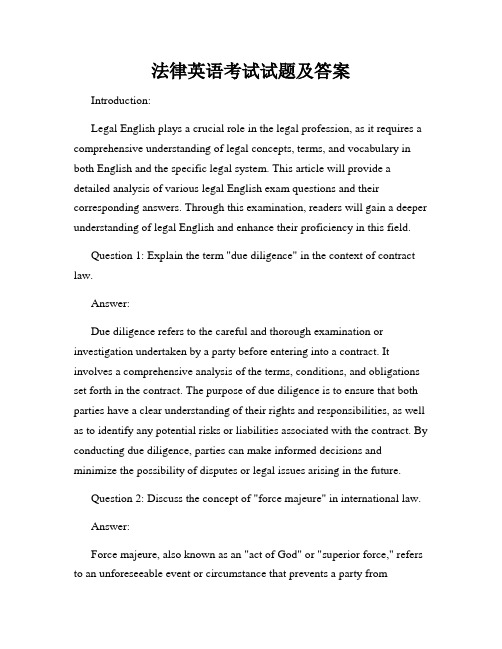
法律英语考试试题及答案Introduction:Legal English plays a crucial role in the legal profession, as it requires a comprehensive understanding of legal concepts, terms, and vocabulary in both English and the specific legal system. This article will provide a detailed analysis of various legal English exam questions and their corresponding answers. Through this examination, readers will gain a deeper understanding of legal English and enhance their proficiency in this field.Question 1: Explain the term "due diligence" in the context of contract law.Answer:Due diligence refers to the careful and thorough examination or investigation undertaken by a party before entering into a contract. It involves a comprehensive analysis of the terms, conditions, and obligations set forth in the contract. The purpose of due diligence is to ensure that both parties have a clear understanding of their rights and responsibilities, as well as to identify any potential risks or liabilities associated with the contract. By conducting due diligence, parties can make informed decisions and minimize the possibility of disputes or legal issues arising in the future.Question 2: Discuss the concept of "force majeure" in international law.Answer:Force majeure, also known as an "act of God" or "superior force," refers to an unforeseeable event or circumstance that prevents a party fromfulfilling its contractual obligations. These events are typically beyond the control of the party involved and cannot be reasonably anticipated or avoided. Examples of force majeure events may include natural disasters, wars, riots, or government actions. In international law, force majeure clauses are commonly included in contracts to protect parties from the consequences of unforeseen events. These clauses typically provide relief or exemption from contractual obligations in the event that a force majeure event occurs, allowing the affected party to suspend or terminate their obligations under the contract.Question 3: Define the term "judicial precedent" in common law systems.Answer:Judicial precedent, also known as stare decisis, is a fundamental principle in common law systems. It refers to the legal doctrine in which the decisions made by higher courts become binding on lower courts within the same jurisdiction. Under this principle, lower courts must follow the legal reasoning and interpretations of the higher courts in previous cases that are similar in nature. Judicial precedent ensures consistency, predictability, and stability in the legal system, as it allows for the uniform application of the law and the development of legal principles over time. However, it is important to note that judicial precedent can be overruled or distinguished when there are significant differences in factual circumstances or legal principles involved.Question 4: Explain the concept of "vicarious liability" in tort law.Answer:Vicarious liability is a legal principle that holds one party responsible for the actions or omissions of another party, even if they themselves did not commit any wrongdoing. This concept often arises in employer-employee relationships, where employers can be held liable for the actions of their employees performed within the scope of their employment. Vicarious liability is based on the idea that employers have a duty of care to ensure that their employees act responsibly and do not cause harm to others. By imposing vicarious liability, the law aims to provide a remedy for victims and encourage employers to exercise proper control and supervision over their employees.Conclusion:Understanding legal English is crucial for professionals in the legal field, as it enables effective communication and interpretation of legal concepts and principles. This article has provided an insightful analysis of various legal English exam questions, encompassing contract law, international law, common law systems, and tort law. By gaining a comprehensive understanding of these topics, aspiring legal professionals can enhance their knowledge and proficiency in legal English, thus paving the way for successful careers in the legal industry.。
法律英语试卷试题及答案
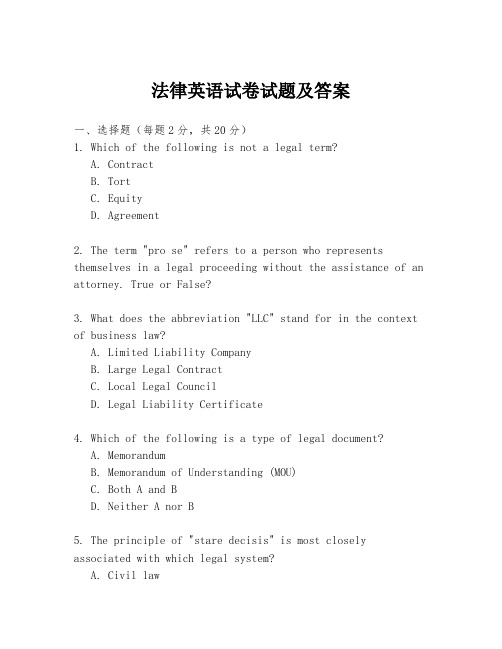
法律英语试卷试题及答案一、选择题(每题2分,共20分)1. Which of the following is not a legal term?A. ContractB. TortC. EquityD. Agreement2. The term "pro se" refers to a person who represents themselves in a legal proceeding without the assistance of an attorney. True or False?3. What does the abbreviation "LLC" stand for in the context of business law?A. Limited Liability CompanyB. Large Legal ContractC. Local Legal CouncilD. Legal Liability Certificate4. Which of the following is a type of legal document?A. MemorandumB. Memorandum of Understanding (MOU)C. Both A and BD. Neither A nor B5. The principle of "stare decisis" is most closely associated with which legal system?A. Civil lawB. Common lawC. Religious lawD. International law6. What is the term for the legal process of resolving disputes outside the court system?A. LitigationB. MediationC. ArbitrationD. Negotiation7. In the context of intellectual property law, "patent" refers to:A. A right to exclude others from making, using, or selling an inventionB. A document that grants ownership of a work of literature or artC. A legal document that protects a brand name or logoD. A license to practice a profession8. Which of the following is a fundamental principle of criminal law?A. Presumption of innocenceB. Right to a fair trialC. Both A and BD. Neither A nor B9. The term "precedent" in legal English refers to:A. A legal principle or rule established in a previous case that is binding in courtB. A document that outlines the facts of a caseC. A legal agreement between partiesD. A formal request for a court to review a case10. What does the term "actus reus" mean in criminal law?A. The guilty mindB. The wrongful actC. The criminal intentD. The legal defense二、填空题(每空1分,共10分)11. In legal English, "due process" refers to the fundamental legal rights that must be observed to ensure a fair trial.- The term "due process" is derived from the Latin phrase "due process of law."12. A "writ" is a formal written order issued by a court, typically directed to someone other than the parties in a case.- An example of a writ is a "writ of _habeas corpus_."13. The term "negligence" in tort law refers to the failure to exercise the degree of care that a reasonable person would exercise in the same situation to prevent harm to others.- In order to establish negligence, a plaintiff must prove the defendant's duty of care, breach of that duty, causation, and _damages_.14. "Probate" is the legal process by which a will is proved to be valid or invalid.- The court that oversees probate proceedings is known as the _probate court_.15. "Jurisdiction" refers to the authority of a court to hear and decide cases.- There are different types of jurisdiction, including_personal jurisdiction_, subject matter jurisdiction, and territorial jurisdiction.三、简答题(每题5分,共20分)16. Define "actus reus" and "mens rea" in the context of criminal law.17. Explain the concept of "joint and several liability" in tort law.18. What is the difference between "specific performance" and "damages" as remedies in contract law?19. Describe the process of "discovery" in civil litigation.四、案例分析题(每题15分,共30分)20. Case Study: A company has been accused of patent infringement. The company argues that they were not aware of the patent and therefore should not be held liable. Discuss the legal principles that may apply to this case and the possible outcomes.21. Case Study: A tenant has been evicted from their apartment without proper notice. The tenant claims that the eviction was unlawful. Analyze the relevant legal provisions and discuss the tenant's potential remedies.五、论述题(共20分)22. Discuss the role of language in legal interpretation and the challenges it presents. Provide examples to support your argument.参考答案:一、选择题1-5: D T A B B6-10: B C A B B二、填空题11. "due process of law"。
《法律英语文本教程》答案
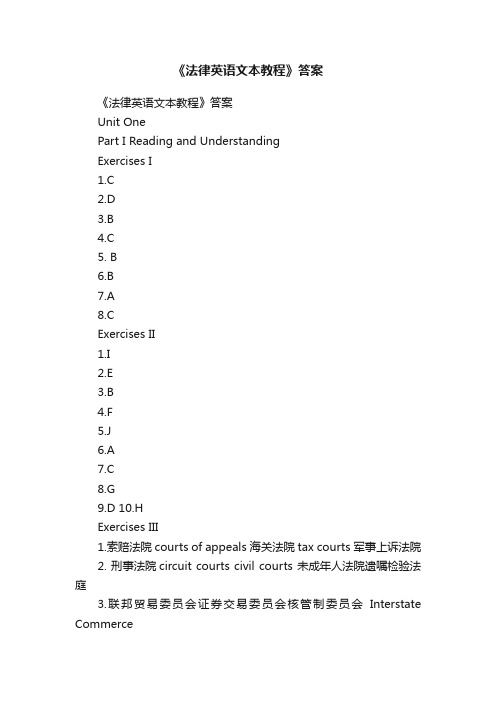
《法律英语文本教程》答案《法律英语文本教程》答案Unit OnePart I Reading and UnderstandingExercises I1.C2.D3.B4.C5. B6.B7.A8.CExercises II1.I2.E3.B4.F5.J6.A7.C8.G9.D 10.HExercises III1.索赔法院courts of appeals 海关法院tax courts 军事上诉法院2. 刑事法院circuit courts civil courts 未成年人法院遗嘱检验法庭3.联邦贸易委员会证券交易委员会核管制委员会Interstate CommerceCommission 联邦电讯委员会Exercises IV1.D2.J3.A4. E5.H6.F7.B8.G9.I 10.CExercises V1. gave top priority to2. take an appeal to a higher court3. vests the president with the power to declare war4. no jurisdiction over5. In compliance with6. 我相信证人的证词。
7. 请将你的合同文本作相应的修正。
8. 几乎所有的成员都同意这项提议。
9. 成文法阻止高等法院复查这样一个裁决。
10. 对别国事物的这种干涉开了一个先例,我们希望其他国家不要模仿。
Part II Practice of Legal Terms1. 单位犯罪的,对单位判处罚金,并对其直接负责的主管人员和其他直接责任人员判处刑罚。
本法分则和其它法律有规定的,依照规定。
2. 人民法院审判案件,除本法另有规定的以外,一律公开进行。
被告人有权获得辩护,人民法院有义务保证被告人获得辩护。
3. 有必要查证这些说法的真实性或虚假性。
Part III Case Discussion杰克逊诉运动城公司一个未成年职业拳击手签订了一个协议,规定无论输、赢或平都有2000美元的报酬。
法律英语第二版课后练习题含答案

法律英语第二版课后练习题含答案题目1Translate the following legal terms into Chinese:1.Jurisdiction2.Liability3.Plntiff4.Defendant5.Tort答案1.管辖权2.责任3.原告4.被告5.侵权行为题目2Translate the following legal terms into English:1.债权2.刑事责任3.知识产权4.证据5.公正答案1.Debt rights2.Criminal liability3.Intellectual property rights4.Evidence5.Frness题目3Choose the appropriate legal term to complete the sentence: The ___________ is the person who is accused of a crime.1.Plntiff2.Defendant3.Jurisdiction4.Liability5.Tortfeasor答案2.Defendant题目4Choose the appropriate legal term to complete the sentence:A ____________ is a legal document that gives a person the right to perform a specific action.1.Liability2.Jurisdiction3.Power of Attorney4.Plntiff5.Defendant答案3.Power of Attorney题目5Match the following legal terms with their definitions:1.Tort2.Liability3.Jurisdiction4.Plntiff5.Defendanta.A civil wrong that causes harm or injury to someoneb.The legal responsibility for one’s actionsc.The power or authority of a court to hear anddecide a cased.The person who initiates a lawsuite.The person who is accused of a crime or sued in acivil lawsuit答案1.a2.b3.c4.d5.e题目6Translate the following sentence into English:根据法律,契约是双方当事人自愿达成的双方都必须履行的协议。
法律英语试题与答案
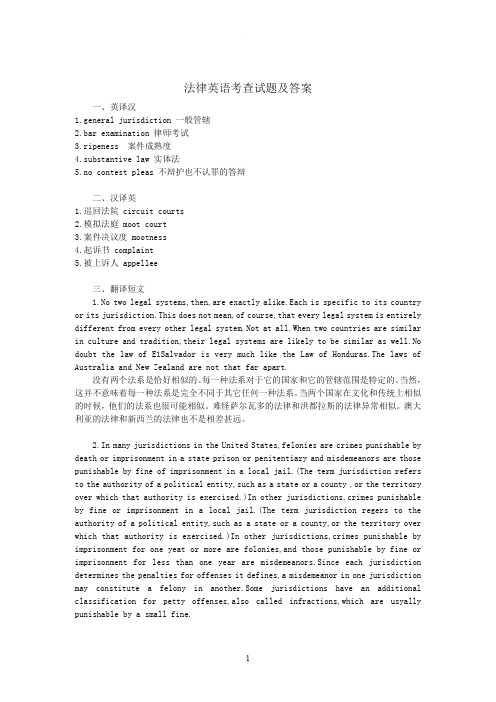
法律英语考查试题及答案一、英译汉1.general jurisdiction 一般管辖2.bar examination 律师考试3.ripeness 案件成熟度4.substantive law 实体法5.no contest pleas 不辩护也不认罪的答辩二、汉译英1.巡回法院 circuit courts2.模拟法庭 moot court3.案件决议度 mootness4.起诉书 complaint5.被上诉人 appellee三、翻译短文1.No two legal systems,then,are exactly alike.Each is specific to its country or its jurisdiction.This does not mean,of course,that every legal system is entirely different from every other legal system.Not at all.When two countries are similar in culture and tradition,their legal systems are likely to be similar as well.No doubt the law of E1Salvador is very much like the Law of Honduras.The laws of Australia and New Zealand are not that far apart.没有两个法系是恰好相似的。
每一种法系对于它的国家和它的管辖范围是特定的。
当然,这并不意味着每一种法系是完全不同于其它任何一种法系。
当两个国家在文化和传统上相似的时候,他们的法系也很可能相似。
难怪萨尔瓦多的法律和洪都拉斯的法律异常相似。
澳大利亚的法律和新西兰的法律也不是相差甚远。
- 1、下载文档前请自行甄别文档内容的完整性,平台不提供额外的编辑、内容补充、找答案等附加服务。
- 2、"仅部分预览"的文档,不可在线预览部分如存在完整性等问题,可反馈申请退款(可完整预览的文档不适用该条件!)。
- 3、如文档侵犯您的权益,请联系客服反馈,我们会尽快为您处理(人工客服工作时间:9:00-18:30)。
法律英语参考答案
法律英语参考答案
在如今全球化的时代,法律英语的重要性日益凸显。
无论是从事国际商务、法律咨询还是涉及跨国合作,掌握法律英语都是至关重要的。
因此,我们有必要了解法律英语的相关知识,并提供一些参考答案,帮助读者更好地应对法律英语的挑战。
一、常见法律英语词汇
1. Contract(合同):A legally binding agreement between two or more parties.
2. Tort(侵权行为):A wrongful act or an infringement of a right leading to civil legal liability.
3. Plaintiff(原告):The party who brings a legal action or lawsuit against another party.
4. Defendant(被告):The party against whom a legal action or lawsuit is brought.
5. Jurisdiction(管辖权):The official power to make legal decisions and judgments.
6. Evidence(证据):The available body of facts or information indicating whether a belief or proposition is true or valid.
7. Damages(赔偿):A sum of money claimed or awarded in compensation for
a loss or injury.
二、案例分析
为了更好地理解法律英语的应用,我们可以通过一个案例进行分析和讨论。
假设有两个公司A和B签订了一份合同,公司A要求公司B提供一批货物。
然而,在交货之前,公司B突然通知公司A无法按照合同约定的时间交货,并提
出延期交货的要求。
公司A对此表示不满,认为公司B违反了合同,并要求赔偿。
在这个案例中,我们可以使用以下法律英语表达来描述和解决问题:
1. Company A alleges that Company B breached the contract by failing to
deliver the goods on time.
(公司A声称公司B违反了合同,未能按时交货。
)
2. Company A seeks damages for the losses incurred as a result of the delay in delivery.
(公司A要求赔偿因交货延迟而造成的损失。
)
3. Company B argues that the delay was due to unforeseen circumstances beyond their control.
(公司B辩称延迟是由于不可预见的情况造成的,超出了他们的控制范围。
)
4. The court will need to determine whether the delay constitutes a breach of contract and if so, the appropriate amount of damages.
(法院将需要确定延迟是否构成了合同违约,如果是,还需要确定适当的赔偿
金额。
)
通过以上案例分析,我们可以看到法律英语在描述法律问题、解释法律条款以
及进行法律辩论方面的重要性。
掌握法律英语不仅有助于理解和运用法律知识,还能提高与国际合作伙伴的沟通能力。
三、学习法律英语的方法
要提高法律英语的水平,以下是一些学习方法和建议:
1. 阅读法律文本:阅读法律文件、合同和案例,熟悉常用的法律术语和表达方式。
2. 学习法律英语词汇:掌握常见的法律英语词汇,如合同条款、法律程序和法
律原则。
3. 参加法律英语培训课程:参加专门的法律英语培训课程,提高听说读写的能力。
4. 练习写作法律文件:通过模拟写作合同、法律意见书等文件,提高写作能力
和理解法律条款的能力。
5. 参与法律讨论和辩论:参与法律讨论和辩论,锻炼口语表达和辩论技巧。
通过不断地学习和实践,我们可以逐渐提高法律英语的水平,更好地应对法律
领域的挑战。
结论
法律英语作为一门专业的语言,对于从事法律工作的人士来说至关重要。
本文
提供了一些常见的法律英语词汇和案例分析,以及学习法律英语的方法和建议。
通过不断地学习和实践,我们可以更好地掌握法律英语,提高在法律领域的竞
争力。
